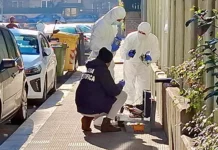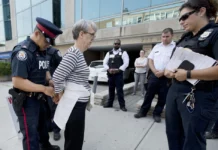By Gary McCullough
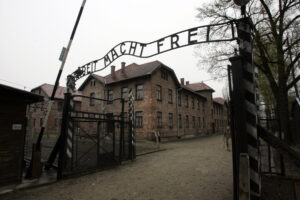
“Work Brings Freedom”
The whistle bellowed and the tracks creaked, as we slowed, then stopped. Shaking from the cold, I knew my anxiety would soon pass. Folded in my vest pocket was my future, my family’s future. The deed to a dairy farm, complete with four cows. We had sold most everything in order to secure our peace; to purchase this deed and the train tickets my wife, my two bundles-of-joy and I were now traveling on.
We brought with us our remaining precious belongings, including my father’s watch, safely tucked in my suitcase. Monica and Teresa each had their suitcases, stuffed with clothing, most of which their mother had hand-sewn, and assorted treasures my four and six-year-olds had stowed away. Each held tightly a doll from their Aunt Olga. My family was ready to start our new life. Here, far from the war, far from the anger and bitterness that had come with the war. Here in our new home in Oświęcim (Auschwitz).
…Life is so good here. Just as they promised. Not a free ride, but with work, comes freedom. The winters, they are not so bad, not as they were back home. Both Margaret and I, we do love it so…
My beautiful wife was reading aloud the letter for the hundredth time. A letter written by Ben, the grocer from our neighborhood. He and his family had come to Oświęcim about this time last year. Six months ago he had written this letter to his parents. When word went about town that we would be leaving, Ben’s parents made a present of the letter. Over and over she read it to the girls, to encourage them on the long trip, to encourage me as well I suppose.
The doors strained open and the cold damp air flushed my face as I stepped on to the station platform.
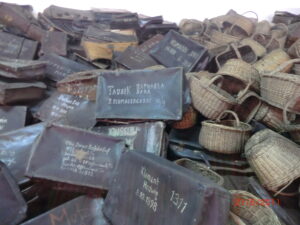
“Leave your suitcases on the platform. Mark your name, age, and nationality on your baggage. To fail to do so will delay the return of your belongings.” The announcement was made again in another, and then another language.
I gathered my family and we walked with the others through a courtyard, then through an iron gate. Across the gate in bold black painted iron letters “WORK BRINGS FREEDOM”. A twenty-five piece band was playing a familiar tune, one that my mother used to hum. The cheery flower boxes looked strange next to the double-barbed wire fence. Still it was all quite an unexpectedly comforting welcome. A distinguished looking man in a physician’s smock approached our growing group and picked a few men and myself, most all the young-and-healthy sort, for a chore he said. Just for a few minutes, he said, then we would be back with our families. Well, I have made it this far by getting along with everyone. “I’ll be back in a minute honey!”
Walking away, I glanced back to see my wife and girls walking into the hospital building. The building with a big red cross painted on it. Some kind of disinfectant shower, someone mentioned.
* * * * *
Attention: “Everyone, the shower here is simple disinfectant, not to worry, it’s not too strong even for your youngest children. Please remove your clothing and fold them in neat stacks. Your co-operation is greatly appreciated.”
* * * * *
The other men and I walked down some steps, through a tunnel, then waited, and waited. We were given
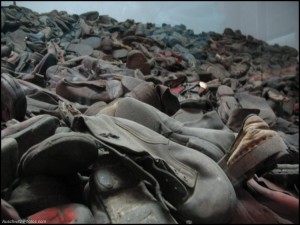
uniforms and wooden clogs and told to wait in another line. As I changed my clothes, I slipped the deed into the lining of my cap. I would just feel more at ease knowing exactly where it was. It represented years of scrimping and all our savings.
Finally, we are going somewhere. Down more steps, another tunnel. I was impressed by the sturdy construction of the walls. And in front of us now were two narrow gauge rail carts, small enough for one man to push empty. We pushed the carts up to where the tracks came to a double wide steel door. Locked at the moment.
An official looking gentleman unlocked and swung open the doors. Without warning my eyes flooded with tears and I dropped to my knees, a cloud of blue-gray haze escaped the through the doorway. As my eyes adjusted and cleared, I was kicked in the back. “Get up, to work now!”
“Doing what?” I began to twist around only to be booted once more. The other men from the train were as perplexed as I. We stumbled into the room. I tripped, as my eyes were still watering, and I landed on something soft, something warm. It was some, some person, an old man, he was limp. I looked up, no words came to my lips. As in a dream as you step off a cliff, you try and yell, but no words come out. No sound ever comes out.
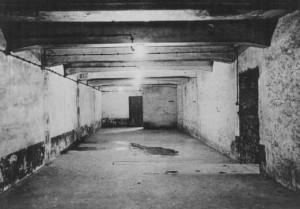
Another and another and another body, no blood, no wounds. There was a young woman, younger than my wife. Next to her, a baby boy, not a year old, still clutching a brightly painted toy car, as I looked at him, such a beautiful healthy boy, the toy escaped his tiny little grasp, his fingers slowly growing cold. The vast room was filled with hundreds of naked bodies. Some of them still hugging each other, others piled on one another. Each one still warm, yet not one breathing. Who are these people!? Who were these people!? What happened? I looked up, screaming at God, and recognized a round, cone shaped, shower head.
* * * * *
In 1992 I visited three death camps in Poland. On the walls of a building in Stuthoff and several building in Auschwitz, hang the portraits of over a hundred of the millions of victims of the gas chambers. At both death camps, you can gaze upon piles of shoes, thousands of pairs of shoes, in all sizes. And literal bales of women’s hair, stacked like some many bales of hay. And next to the hair-bales are bolts of fabric that had been manufactured from the hair shaved from the heads of thousands of dead, murdered young women. And suitcases, piled to the ceiling, marked with white paint, the name, year of birth, and nationality of the owner. Many of the suitcases were of children; five, six, and seven years old. Another room was full of eye glasses, the next, brushes and combs, the next room, stacked wall to wall, floor to ceiling, were prosthesis all every sort, legs and arms, and wheel-chairs and crutches.
This collection, this shrine to “Never-Again,” displayed what was but a fraction of the booty gathered from the killing of millions of mothers, sisters and brothers, husbands and grandparents and children over the years we now call the Holocaust. These were the items that had not yet been packaged for shipment. These glasses, shoes, clothing, etc. were to be shipped to people in need, taken from useless non-persons, to go to the sustenance of the higher race. A guard, would pick through the belongings of the still warm non-person for something to send home to his family; perhaps a needed pair of pants, or a Sunday’s-best dress that his bride would wear about town with him on his next leave, a pair of glasses that would be of use to his mother, she has needed a better pair for oh so long.
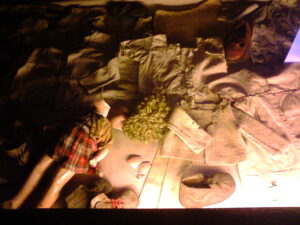
Of all these exhibits screaming of man’s inhumanity toward man, one moved me to tears, a small pile of children’s toys.
As our tour group exited the building, I approached our guide. Why didn’t someone stop this? Why did the townspeople blow the place up? Why didn’t our allied forces obliterate the death camps?
Her response was one well thought out. As a guide at Auschwitz for seven years, she is asked that most every day. She stated, “Many people for years, much wiser than I, have debated that exact question. Survivors of this camp have said they would have gladly given their lives to see this place destroyed and the killing stopped. One thing that most all agree on though, is in regard to the three sets of railroad tracks coming to the camp. They should have been destroyed. They knew where the killing was being done. They had the ability, and even if the tracks would have been rebuilt in a matter of days, thousands of lives would have been saved, thousands of lives!
Immediately I responded, “You know, that’s what we do.” Up to this point, she did not know that the entire group touring Auschwitz that day were part of a group in the USA called Operation Rescue. I went on to explain to her, and to myself at the same time, that when we rescue, we take out the tracks. We don’t destroy the clinic/death-camp, we don’t kill the butchers. But for a short period of time we keep the non-persons/the babies, from getting to the death-camp. We buy a little time for the innocent.
Two weeks later, while hand-cuffed, from the back of a paddy-wagon, I found myself preaching to nine of San Antonio’s Finest. While these officers were arresting and carrying away one limp rescuer after another I began to tell them of my recent trip to the death-camps of Auschwitz, Birkenau and Stuthoff.
Officer, did you know…
At the Auschwitz death-camp:
Many Jews, Poles and others believed going to Auschwitz was an investment in their future
At the San Antonio death-camp:
Many women come here believing that this is an investment in their future.
The Cyclon-B nerve gas was delivered in train cars marked with the Red-Cross as medical
The abortion devices are sold and delivered, and even tax-deductible as medical equipment.
A heart injection was sometimes used to terminate the Jews.
A heart injection is sometimes used to terminate the baby.
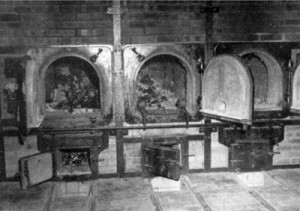
Many of the bodies were burned in crematoriums, at the Nazi death-camp.
Many of the bodies are burned in crematoriums, at the abortion death-camp.
The availability of healthy, live bodies drew many German researchers for experimentation and profit.
The availability of healthy, live bodies draws many researchers for experimentation and profit.
They disguised the gas-chambers as hospitals and medical clinics.
They disguise the abortion-chambers as hospitals and medical clinics.
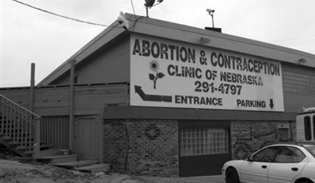
The Nazis dressed up in the clothing of priests, and mocked God.
Pro-abortion advocates dress up in the clothing of priests, and mock God.
Gruesome experimentation was performed, often simply for the sick entertainment of so called doctors.
Gruesome experimentation is performed, often simply for the sick entertainment of so called doctors.
Body parts were used for decoration and jewelry.
Body parts are used for decoration and jewelry.
Often, because of their health condition, it was considered dignified and more humane to end the Jews’ lives.
Often, because of their health condition, it is considered dignified and more humane to end the babies’ lives.
All that remains are the ashes of millions of innocent Jews.
All that remains are the ashes of millions of innocent babies.
Many Christians enjoyed their freedoms, while co-existing with the Nazi death camps.
Many Christians enjoyed their freedoms, while co-existing with the abortion death camps.
Only a small segment of the German church took a stand against the killing, and they were easily handled.
Only a small segment of the Church takes a stand against the killing, and they are easily handled.
Most of the world could not, or would not believe the Jewish holocaust was happening.
Most of the world cannot, or will not believe the abortion holocaust is happening.
German judges, police, guards, all said they were just, doing their jobs.
American judges, police, guards, all say they were just, doing their jobs.
The German church said they were just obeying the law.
The American church says they are just obeying the law.
We have simply become more efficient in the disposing of our non-persons. In part, the job is much easier today because the bodies are smaller and more easily disposed of.
Then the paddy-wagon door shut and a truck load of Christian men finding themselves on their way to jail began to pray.
Others prayed aloud, for the mother waiting to enter the soon to be opened clinic, for God to rescue the children who would be killed there that day. Then it was my time, before God, to open my heart…
Dear Lord, I remember how angry I was, and still am over that pile of children’s toys at Auschwitz. How these harmless steps we were taking this morning don’t seem to be a match to the violent death awaiting our holocaust victims.
How could even a brain-washed Nazi death-camp guard take a toy off the still warm body of a dead child and give it to his child?! In that sentence, God answered my question with His question:
“How is it that you, my son, washed by me, give your children toys taken from the children killed at the abortion death-camps?”
My crushing anger was now, full-weight on me. How can this be, Lord? I am about to go to jail…again. I am doing all I know to do!
“For each child that is killed; his toys will instead be enjoyed by your children.”
Like it or not I have to face the fact that each day I find something more important to do than saving an unborn child’s life, I have chosen that my job, my comforts, my wife’s clothing and yes, even my children’s toys were more important than the life of an unborn child.
There is no “feel-good” end to this story; no secret solution. We have gone too far down the road to Auschwitz. We have a thousand Dachaus, Treblinkas, and Auschwitzes in America, advertising in the yellow-pages.
As the death-camps reared their ugly heads in World War II. Some of America’s citizens recognized the threat and rose to the challenge. They didn’t wait for our nation to enter the war, they went to Canada, enlisted, and went to fight Hitler and the Nazi War Machine. However, most of the nation waited for an official declaration of war.
But when war was declared, every able-bodied, clear thinking man entered the fight. If a young man was not serving his country, his courage and manhood was called into question. Men and women came from the countryside to the cities to work in the factories as part of the war effort. Factories that produced automobiles and appliances re-tooled to make items needed to win a war. Housewives conserved everything from nylons to rubber-bands to help beat the Nazis. And still the ashes of millions of burned bodies testified that we did too little, too late.
When will the time has come for us to do our duty before God and country in regard to the holocaust of abortion? When will it be time for every able-bodied, clear-thinking Christian to enter the fight? If a young man is not saving the lives of innocent children, is his courage and manhood called into question?
As in Nehemiah, chapter three, everyone from merchants to shepherds set aside their usual job for a time, to rebuild the wall. Every Christian ministry, God ordained and set apart for a particular need, must re-tool to win this war. To continue to do business as usual while there are death-camps operating down the street is an insult to our Creator.
And still the ashes of millions of burned bodies will testify that we did too little, too late.
In the story, Ben’s letter to his parents was forced and censored. It was common practice to keep a few Jews, Poles, and others alive for six months. They would be forced to write home and lie to their friends or relatives about the conditions at Auschwitz. After the letter was written they would be taken to the gas chamber and killed like the others, then cremated.
Hanging on the wall today in Auschwitz is a fragment of an actual uncensored letter from Monika Dombke, born 1920, to her mother. That letter reads:
Electric wires, high and double
Won’t let you Mom – you won’t see your daughter
So don’t believe those censored letters of mine
cause the truth is different; but don’t cry, Mom.
And if you would like to seek out your child’s trace
Don’t ask anyone, don’t knock anywhere:
look for the ashes in the fields of Auschwitz
It will be there. But don’t cry – enough of bitterness here.
And if you would like to discover your child’s trace
look for the ashes in the fields of Birkenau
They’ll be there – so look for the ashes
In the fields of Auschwitz, in the woods of Birkenau,
Mom, look for the ashes – I’ll be there!

